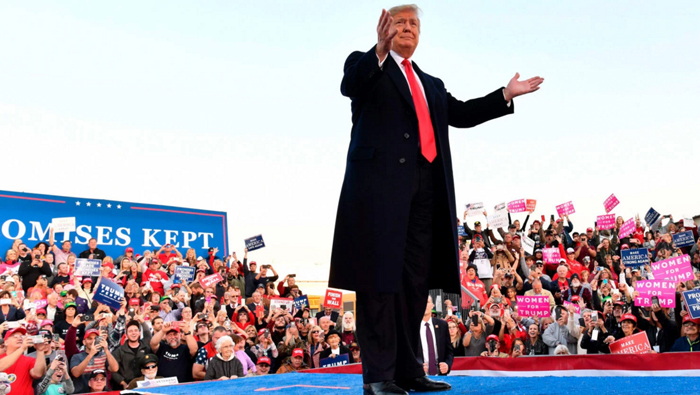Is America greater under Trump? It depends how you measure it.

Would I lie to you? Donald Trump on the hustings, 2018. PHOTO Nicholas Kamm/AFP/Getty
Two years ago the US shocked itself and the world by electing Donald Trump on the promise that he would make America great again. So how’s that going?
That isn’t a completely idle question. The US economy is on the move and employment is rising. In Trump territory, with mothballed coalmines and steelworks operating again, there’s a general air of optimism that their man is on the right track.
It could be argued that Trump’s chosen techniques in dealing with tyrants (puffery, flattery) and democratic allies (indifference, contempt) have had some success. Kim Jon-Un, for instance, seems to have stopped shouting and started talking, though that story still has a long way to go.
These are early days; such things may turn out to be substantial or they may be just specks on history’s broad canvas.
Other impacts of Trumpism, however, are already clear, and certainly not inconsequential. His response to events within and outside the US tell a worrying story about the values of the man in the White House and where these are taking the country – and the world.
A few thousand Central Americans in several groups, fleeing civil strife and seeking US asylum, are presently in far-southern Mexico, over 2000 km by road from the US border. Past experience of these “caravans” suggests few people will make it even to Mexico City, still over 1000 km away.
Without citing evidence, Trump said the caravans harboured “some very bad people… This is an invasion of our Country”. He ordered thousands of troops to the border and warned that refugees who threw stones at them would be treated as if they carried rifles.
“Go into the middle of the caravan,” he told a media interviewer. “You’re going to find Middle Eastern, you’re going to find everything.” His own military advised there was no evidence for his claim but he repeated it anyway. Fear is a potent political tool.
The mid-term election campaign and “The Caravan” especially have added a whole drawer-full to an already-burgeoning file of false statements by Trump, as catalogued assiduously by Glenn Kessler’s Washington Post Fact Checker blog.
It was clear from day one that truth-telling (or its absence) would be a defining factor in Trump’s presidency. Since then Kessler and his team have subjected each of his factual claims to a rigorous, transparent checking process.
This revealed a rising crescendo of falsehoods in the final weeks of the mid-term campaign, including one day last month when Trump made 84 claims that were untrue. Over that month he made over 1000 false statements, bringing his presidential total to date to over 6400.
Of the many attempts to analyse and explain this phenomenal rate of misstatement (in the absence of evidence about prior knowledge I wouldn’t call it all outright lying), most conclude simply that Trump is a president like no other.
The president doesn’t care about factual accuracy, but he does value truth as a political weapon. While accusing detractors of lying, he constantly reassures followers that in today’s ocean of fake news Donald Trump is a beacon of honesty, the only person they can rely on for real truth.
Alas, if only that were true.
Another element of the Trump campaign toolbox is altogether more sinister. The language of physical violence has surfaced often during the president’s term of office, as it did in the months before his election.
At one of his early campaign rallies Trump told supporters to “knock the crap” out of anyone they saw preparing to throw a tomato at him, adding “I promise you I will pay for the legal fees.”
At another rally the same month he drew supporters’ attention to a protester being escorted away: “He’s walking out with big high-fives, smiling, laughing. I’d like to punch him in the face, I tell you.”
Then there is the notorious case of Greg Gianforte, who as a candidate for Congress in 2017 got annoyed at a news reporter and slammed him to the floor. Gianforte was fined for assault and required to undertake anger management training.
Some of us might have questioned the fitness for office of a man who can’t contain his rage at a reporter’s questioning. Trump’s view is, well, Trumpian. Just a month ago he told a Montana rally that “any guy that can do a body slam, he’s my type!”
Donald Trump is now firmly ensconced in the White House. It will take more than a mid-term tremor to unseat this reality-TV star, supported by his own simplified, scripted reality.
For progressive liberals – special targets of Trump – a nation’s greatness must incorporate concepts like social justice and equality. But greatness to Donald Trump resides in the size of your bicep, or your armoury, and on measures like that America seems to be doing just fine.
